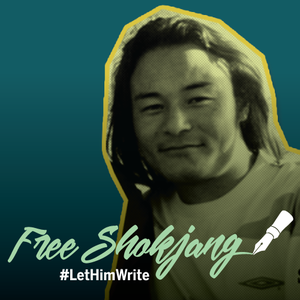Organisations all over the world commemorated the annual “Day of the Imprisoned Writer” on November 15. Just as every year, PEN International organised the event and reported about writers who have to face “unjust imprisonment”. According to the NGO (non-government organisation) it is a day to encourage the public to donate or write letters of appeal for writers in prison.

Photo: PEN
Students for a Free Tibet used the day to raise awareness about Drukar Gyal, a Tibetan writer also known by his penname Shokjang. Following his arrest in May 2015 it took the court more than seven months to hold a trial as Shokjang continued to claim his innocence. On February 17, 2016 he was sentenced to three years imprisonment for “inciting separatism”. According to the court his crimes included possessing forbidden books and sharing excerpts online – as well as writing about the freedom of religious belief.
Just a week after the sentence, Shokjang published a handwritten appeal to the Qinghai Higher People’s Court, still defending his innocence. “Freedom of religious belief is an important right of citizens defined by the constitution”, he wrote. For the full translation of his letter click here.

Photo: Gu-Chu-Sum
The Gu Chu Sum Movement of Tibet, an NGO based in Dharmashala which represents former political prisoners of Tibet, hosted a poetry night in Dharamkot on the evening of the 15th, presenting traditional folk songs and various poems. An empty carpet was laid out on the floor to remind the guests of Shokjang and other imprisoned Tibetan writers.
Many famous writers had joined this year’s campaign by writing a letter to artists in prison. It was the previously arrested Chinese dissident activist and artist Ai Weiwei who wrote that “[only] societies that protect freedom of speech […] have any chance of a positive future.” According to him “People have paid a price in the struggle for freedom of speech and expression, which is unfortunate but also necessary.”
PEN International was founded in 1921 in order to “promote literature and defend freedom of expression worldwide”. To remember this basic human right and those people suffering under totalitarian governments for expressing their feelings and criticism in arts, the “Day of the Imprisoned Writer” has been commemorated every year since 1981.




 Print
Print Email
Email